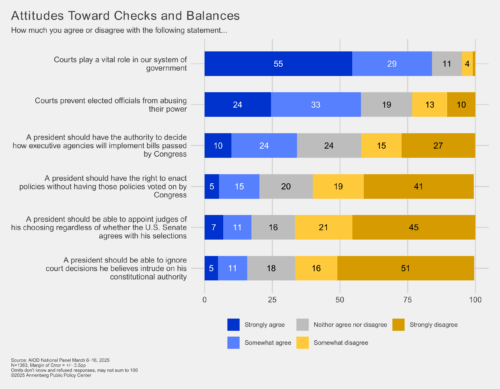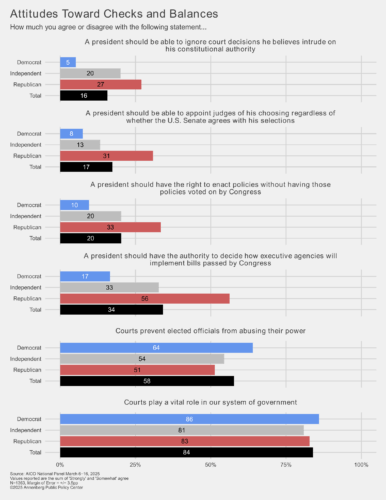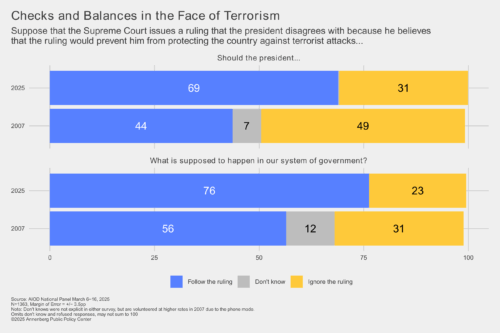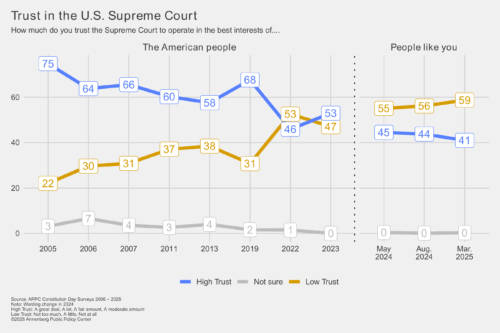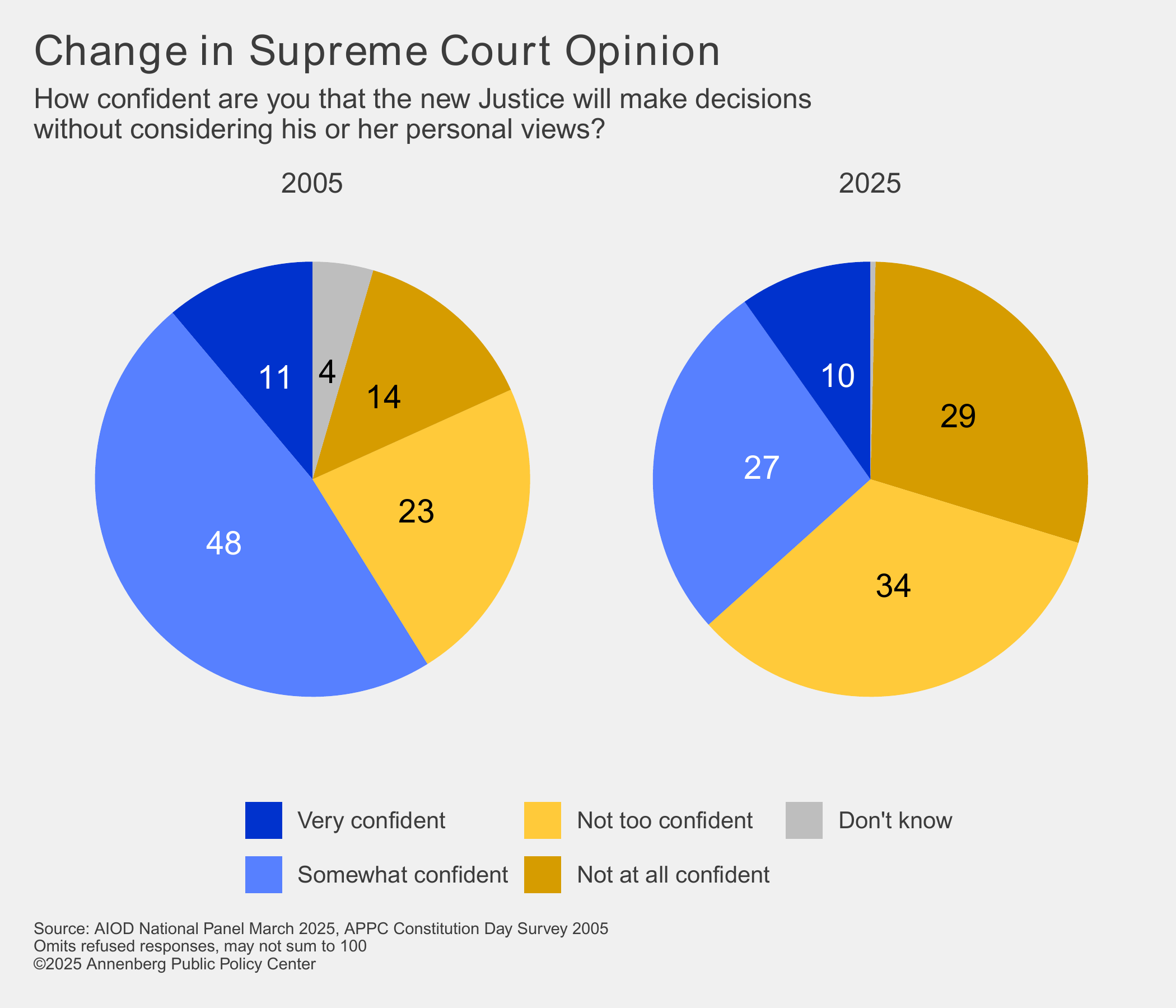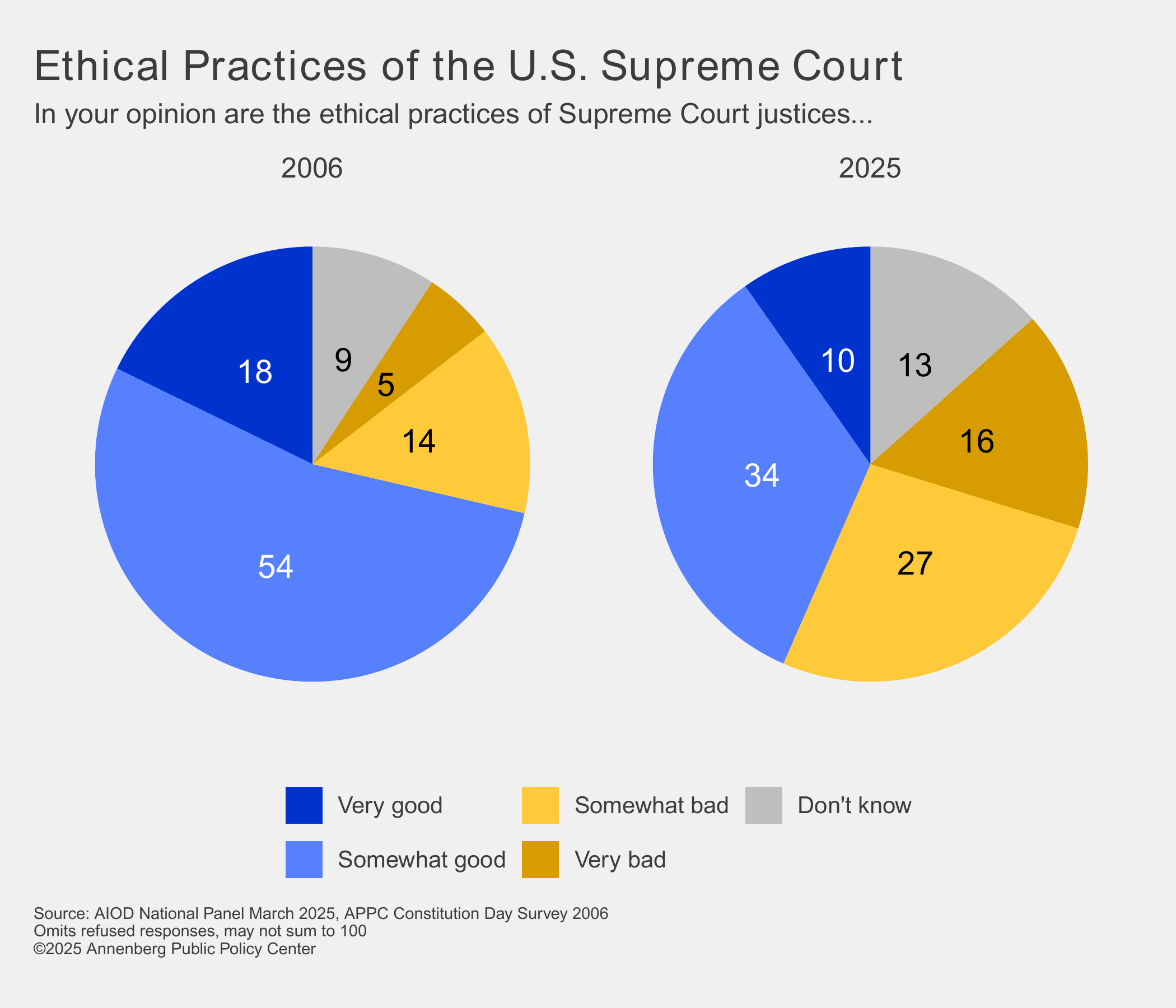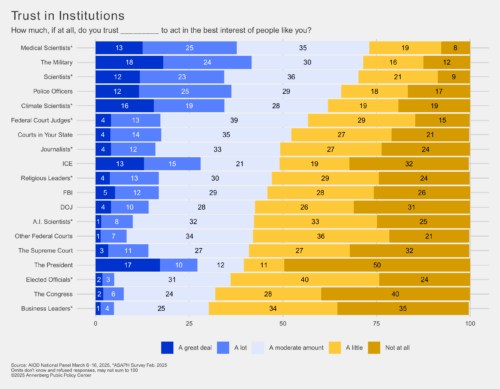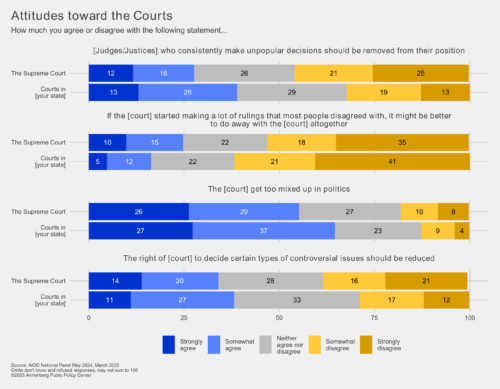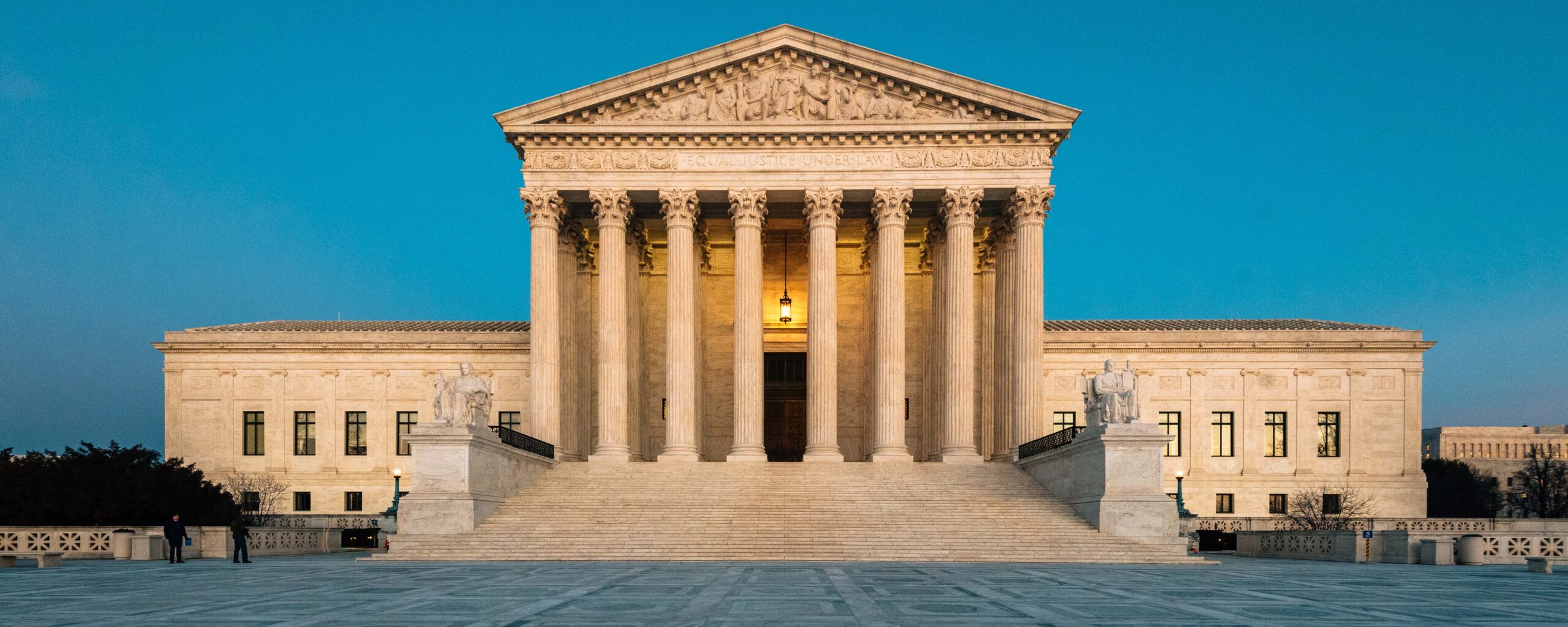Large majorities of U.S. adults support the role of the courts and Congress in serving as checks on presidential power, even though the public has less trust in all three branches of the federal government than it does in many other American institutions and professions, according to a survey from the Annenberg Public Policy Center (APPC) of the University of Pennsylvania.
The policy center’s Institutions of Democracy survey finds that trust in the U.S. Supreme Court has continued to decline since the court’s 2022 Dobbs ruling overturning the constitutional right to abortion codified in Roe v. Wade. Trust in the nation’s highest court has slid 27 percentage points since 2019, from 68% six years ago to 41% in March 2025. Nearly a third of those surveyed (32%) say they have no trust at all in the Supreme Court to operate in the best interests of “people like you.” In just the past 10 months, since May 2024, the percentage of those with no or low trust in that court grew to 59% from 55%.
Highlights
The survey, conducted March 6-16, 2025, with a nationally representative sample of 1,363 U.S. adults who are part of APPC’s ongoing survey panel, also finds that:
- A majority of Americans (60%) think the country is going in the wrong direction and a slim majority (54%) think a year from now the economy will be worse than it is today.
- A strong majority (69%) of Americans say the president should follow a Supreme Court ruling, even if the president believes the ruling prevents him from protecting the country from a terrorist attack.
- Compared with 20 years ago, Americans are much less confident that Supreme Court justices will make decisions without considering their personal views and find the ethical practices of the justices to be significantly worse.
- Jury service is a way to bolster trust in the legal system and is positively associated with views of increased legitimacy and trust in the courts, and more positive views of judges. But fewer people report being called for jury duty and a smaller proportion of those who are called are serving.
“Because judges have neither the power of the purse nor of the sword, it is especially important that they retain the respect and confidence of the citizenry and that the public appreciates the indispensable role that the courts play in protecting our rights, sustaining our system of government, and helping the country navigate contentious issues and times,” said Kathleen Hall Jamieson, director of the Annenberg Public Policy Center.
For the data, see the topline.
Americans support a system of checks and balances
Less than a quarter of U.S. adults endorse the idea of unchecked executive action. Even among Republican voters, who are the most supportive of a president in their own party, only a minority support unconstrained executive action. (Consistent with many surveys, this analysis includes independent voters who express a preference for either the Democratic or Republican party with that party’s data.)
“Americans do not think the president should have the ability to act unconstrained by the courts and Congress,” said Matt Levendusky, director of APPC’s Institutions of Democracy division and a Penn political science professor, who, with APPC research analyst Shawn Patterson Jr., wrote about the issue for NBC News. “Democrats, Republicans, and independents alike believe that the courts and Congress should be able to check the president’s actions.”
A majority of Americans do not think a president should be able to…
- Ignore court rulings: Two-thirds (66%) disagree with the statement that the president should be able to ignore court decisions he believes intrude on his constitutional authority, while 16% agree. Just 27% of Republicans, 20% of independents, and 5% of Democrats agree.
- Pick judges without Senate consent: Two-thirds (67%) disagree with the idea that the president should be able to appoint judges of his choosing regardless of whether the U.S. Senate agrees with the selections, while 18% agree. Under a third (31%) of Republicans agree, as do 13% independents and 8% of Democrats.
- Enact policies without Congressional approval: 60% disagree with the proposition that the president should have the right to enact policies without having those policies voted on by Congress, while 20% agree. A third of Republicans (33%) agree, as do 20% of independents and 10% of Democrats.
The public is more closely divided on whether the president should have the authority to decide how executive agencies will implement bills passed by Congress, though a plurality is opposed, with 40% in opposition and 34% in agreement. Over half of Republicans (56%) agree that the president should have the authority, but just 33% of independents and 17% of Democrats do.
A majority of Americans endorse the essential role of courts in our government:
- Play a vital role: 84% agree that courts play a vital role in our system of government, including 86% of Democrats, 83% of Republicans, and 81% of independents.
- Prevent abuse of power: 58% believe the courts prevent elected officials from abusing their power, including 64% of Democrats, 54% of independents, and 51% of Republicans.
Obey the courts – even when faced with terrorism
Compared with data from a 2007 Annenberg survey, Americans today are more likely to say that the president should follow a Supreme Court ruling, even if the president believes that the ruling prevents him from protecting the country against a terrorist attack:
- 69% say the president should follow the Supreme Court ruling, up from 44% in 2007. Almost a third (31%) now say the president should ignore the ruling.
- Three-quarters (76%) say that having the president follow the ruling is what is supposed to happen in our system of government, up from 56% in 2007. Under a quarter (23%) say the president is supposed to ignore the ruling.
“People want the president to listen to the Supreme Court and they think that our system of government requires the president to do so,” said Patterson.
Trust in the Supreme Court
Trust in the Supreme Court has continued to sink. In March 2025, 59% of those surveyed report having little (27%) or no (32%) trust in the court to operate in the best interests of “people like you.” Just 41% express confidence that the court is operating in their best interests, with 27% reporting “a moderate amount” of trust, 11% “a lot,” and 3% “a great deal” of trust.
The number of those with no or low trust has risen over the past 10 months to 59% from 55% in May 2024, while the proportion of those with high/moderate trust (41%) has continued to fall from 45% in May 2024. The Annenberg Public Policy Center has been surveying on this question since 2005, when 75% had high/moderate trust and 22% had low/no trust.
Earlier APPC surveys found that trust in the court has plummeted since the 2022 Dobbs decision overturning the half-century-old landmark Roe v. Wade ruling that codified the right to abortion. Americans’ trust in the court, which was 68% in 2019, has fallen 27 percentage points to 41%.
Public views more negative of Supreme Court justices
Compared with 20 years ago, Americans are much less confident Supreme Court justices will make decisions without considering their personal views. Just 37% are very or somewhat confident a new justice appointed by President Trump will make decisions without considering their own personal views, down from 59% in 2005 (when the question referenced President Bush). Nearly two-thirds (63%) are not too/not at all confident a new justice would make decisions without considering their personal views, up from 37% in 2005.
The public also holds much more negative views of the justices’ ethics, as compared with an APPC 2006 survey. The public is currently divided in its views about the justices’ ethical practices: 44% say they are very/somewhat good and 43% very/somewhat bad. In 2006, nearly three-quarters (72%) thought the justices’ ethical practices were very/somewhat good, far more than those who considered them very/somewhat bad (19%).
Compared with 2005, nearly twice as many people say their opinion of the Supreme Court has declined in the past 10 years. Today, 51% say their opinion of the court has declined in the past 10 years, compared with 27% who held that opinion in 2005.
In considering the judicial system apart from the Supreme Court, however, respondents express greater levels of trust in federal court judges (56%) and courts in their state (52%).
U.S. “on the wrong track” and low trust in government institutions
A majority of Americans feel that in the United States, “things are seriously off on the wrong track” (60%) rather than “generally going in the right direction” (40%). And most (54%) also feel that a year from now, the nation’s economy as a whole will be worse than it is today, rather than better (36%), with 10% saying the country will be “about the same” as it is today.
It is not just the Supreme Court that has low levels of trust. Only business leaders are less trusted than the three branches of the federal government. When the American people are asked how much, if at all, they trust different organizations and professions to act “in the best interest of people like you,” they express the greatest trust in medical scientists (73%), the military (72%), and scientists in general (71%) (combining the responses for a great deal/a lot/a moderate amount of trust), according to APPC surveys conducted in February and March 2025.
By contrast, there is much less trust in the U.S. Supreme Court (41%) and the President (40%), followed by “elected officials” (36%) and Congress (32%). Business leaders (30%) are at the bottom of these groups.
“Even though people say they don’t have much trust in particular government institutions – Congress, the President, the courts – they do express support for our system of government,” Patterson said. “They support the idea of checks and balances, if not the individual branches themselves.”
Limiting the power of the judiciary
In the 2024 Judicature article “The withering of public confidence in the courts,” APPC researchers reported survey evidence suggesting that while the public had greater confidence in the judiciary than the other branches, the distance separating the perceptions of courts from those of other branches has narrowed in recent years. While respondents in the current survey place more trust in the courts in their own state to act in the best interest of people like them than in the Supreme Court, they are also more supportive of some steps to limit the power of those courts.
The survey finds that:
- Nearly 3 in 10 (28%) agree that Supreme Court Justices who consistently make unpopular decisions should be removed from their position – and 39% feel that way about other judges.
- A quarter (25%) say that if the Supreme Court started making a lot of rulings most people disagreed with, it might be better to do away with the court altogether, while 16% feel this way about local courts.
- Over half of those surveyed (55%) say the Supreme Court gets too mixed up in politics – and 65% feel that way about other courts.
- Over a third (34%) say the right of the Supreme Court to decide certain types of controversial issues should be reduced – and 38% feel that way about other courts.
The positive effects of jury service
“Understanding the workings of the judiciary and the unique role courts play in American government may help foster greater trust in and support for the institution of the courts,” said Ken Winneg, APPC’s managing director of survey research and a coauthor of the Judicature article. As other researchers in communication, legal studies, and political science have written: “to know courts is to love them.”
The APPC survey finds that fewer people report being called for jury service, with 35% saying they were called: 31% were called but did not serve, and 4% served on a jury. Five years ago, in 2020, 41% of Americans had been called for jury service: 33% reported being called but did not serve, and 8% served on a jury. The declining rate of jury service matches other data showing there are fewer jury trials, including a 2023 report from the National Center for State Courts, which reports that the estimated number of jury trials in state courts has diminished since 2007 from 148,558 to 48,764 in 2021.
A regression analysis by Patterson of APPC’s data shows that jury duty is positively associated with greater belief in the legitimacy of the courts, greater trust in the courts, and a greater willingness to ascribe positive traits to judges – for instance, that they are competent, trustworthy, and fair. In its annual Constitution Day Civics Survey, published every year before the holiday on Sept. 17, the policy center has examined civics knowledge among a nationally representative sample of U.S. adults. The survey has repeatedly shown that civics knowledge is positively associated with beliefs in the legitimacy of the courts and the belief that one would receive a fair trial.
“The courts play an important role in educating the citizenry about the importance of the judiciary in our system of government,” Jamieson said.
A more detailed analysis of the survey findings will be published later this year in the journal Judicature.
About the survey
The current findings come from the most recent wave of the Annenberg Public Policy Center’s Institutions of Democracy panel survey, which was conducted March 6-16, 2025, with a nationally representative sample of 1,363 U.S. adults. The margin of sampling error for the complete set of weighted data is ±3.5 percentage points at the 95% confidence level.
For details, see the topline and methodology statement.
The survey questions were developed under the supervision of Matt Levendusky, director of the Annenberg IOD national panel. The analysis and graphics were prepared by APPC research analyst Shawn Patterson Jr. The team supervising the survey includes Kathleen Hall Jamieson, APPC’s director, and Ken Winneg, APPC’s managing director of survey research.
The Annenberg Public Policy Center was established in 1993 to educate the public and policy makers about communication’s role in advancing public understanding of political, science, and health issues at the local, state, and federal levels.
